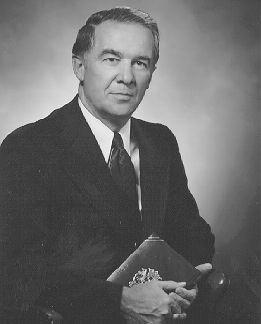 Thomas A. Spragens
Thomas A. Spragens
Centre College President (1957-1981)
Thomas A. Spragens, only the fourth Centre president who was not an ordained Presbyterian minister, took office on November 11, 1957, and served the college for 24 years. Only John C. Young (1830-1857) served longer. Spragens, who came to Centre from the presidency of Stephens College, led Centre into an era which elevated the college into a new prosperity and radically altered the face of the campus.
Born on April 25, 1917, in Lebanon, Kentucky, Spragens was one of seven children in the family of William Henry and Lillian Brewer Spragens. His father was a lawyer and long-time circuit judge in the Eleventh Judicial District. All of Spragens' brothers and sisters graduated from college.
After attending public schools in Lebanon, Spragens enrolled at the University of Kentucky, where he majored in economics. After graduating in 1938, a growing interest in public administration led him to accept a position as research assistant in the Kentucky Department of Revenue in June 1938. The following year he accepted a Maxwell fellowship in the graduate school of public affairs at Syracuse University. In the summer of 1940 he went to Washington to work as administrative analyst at the Bureau of the Budget. Originally only a temporary position, Spragens was asked to remain, and accepted the offer. For the next five years, 1940 to 1945, he served primarily in the federal government, including senior analyst at the Bureau of the Budget and Assistant Chief of Food Allocations in the wartime Foreign Economic Administration.
At the conclusion of World War II, with colleges and universities facing major challenges in their postwar role, Spragens was approached by Stanford University to serve as the institution's representative in Washington. In the summer of 1946, Spragens and his family moved to Palo Alto to assist the president of Stanford in managing development problems caused by that school's exploding enrollment. He remained as assistant to the president for five years, serving under two presidents and two interim presidents.
In 1951 Spragens was asked to join as secretary and treasurer the newly formed Fund for the Advancement of Education, a foundation subsidiary to and financed by the Ford Foundation. The charge was to carry on the interests of the parent foundation in the area of higher education. In 1952, he was invited to serve as the president of Stephens College in Columbia, Missouri. He remained at that school until 1957, when he accepted the presidency of Centre College.
During the Spragens administration student enrollment nearly doubled, as did the size of the faculty; the curriculum was extensively revised to provide a better interdisciplinary education; the endowment increased approximately nine-fold; and Centre obtained a chapter of the prestigious Phi Beta Kappa.
President Spragens played a major roll in fund raising efforts, particularly in the later years of his presidency with the Fund for the Future Campaign, a drive which raised about $34 million. During his presidency, the following buildings were constructed: Fraternity Quadrangle (1961); Acheson-Caldwell, Cheek-Evans and Yerkes Dormitories (1962-63); Cowan Dining Hall (1962); Grace Doherty Library (1967); Boles Natatorium (1968); Nevin Hall Dormitory (1968); "New" Young Hall Science Building (1970); Overstreet House (residence of the Dean of the College, 1973); Regional Arts Center (renamed the Norton Center for the Arts, 1973); Hillside Houses (dormitories, 1974); and a new section of Alumni Memorial Gymnasium (1981). In addition, the following buildings underwent substantial renovation: Sutcliffe Hall (1961); McReynolds Hall (1962); and Wiseman-McReynolds (1969) - while old landmarks such as Old Main, Hillcrest, and Morgan Hall (Women's Campus) disappeared. Another era in Centre's history came to an end when Centre closed the women's campus on Lexington Avenue, and consolidated the campuses in 1962.
While president of Centre, Spragens served a three-year term as director of the American Council on Education. He also served as a member of the commission on colleges of the Southern Association of Colleges and Schools, and as director and chair of the Southern University Union, a consortium of nine colleges cooperating with Vanderbilt University.
Spragens also served as a director of the Kentucky Independent College Foundation and for four years was chairman of its executive committee. He also served as a member of the executive committee of Independent College Funds of America, and served the Association of American Colleges as a member of its commissions on College Finance and on Legislation.
During Spragens' quarter century of service, he witnessed major changes on college campuses - from the conservative atmosphere of the late 1950's to the campus unrest of the late 1960's; from the more prosperous years of the Great Society to the depressed economy of the late 1970's. President Spragens asked to be relieved from his duties as president on November 16, 1981.
After retiring as president of Centre College, Spragens remained active in public service. In addition to acting as consultant in the area of higher education, he served on the Kentucky Council of Higher Education, the board of trustees of Pikeville College, the board of Shakertown, Leadership Kentucky, the board of the Presbyterian Homes and Services, as commissioner for the city of Danville, and numerous committees for the First Presbyterian Church in Danville, Spragens was a member of Phi Beta Kappa and of Omicron Delta Kappa. He was married and had two sons and a daughter. Mrs. Spragens (Catharine Smallwood) is a native of Oxford, Mississippi, and a graduate of the University of Mississippi.
Spragens died on February 11, 2006)
For additional information see

